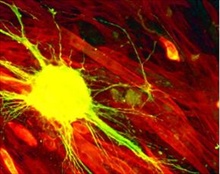Members Login

Channels
Special Offers & Promotions
Unlocking the potential of Stem Cells in Neuroscience Research
 AMSBIO has written an
informative technical article to enable neuroscience researchers to learn more
about a new method to control and direct differentiation of physiologically
relevant neural cell types using stem cell qualified reagents.
AMSBIO has written an
informative technical article to enable neuroscience researchers to learn more
about a new method to control and direct differentiation of physiologically
relevant neural cell types using stem cell qualified reagents.Stem cells have revolutionized our approaches to and understanding of neuroscience. The key to research success is the ability to control and direct differentiation into physiologically relevant neural cell types.
Controlling cell differentiation in a predictable way is a major challenge in stem cell research. The new method described within the article shows how to differentiate adult neural stem cells and pluripotent ES cells using 3D extracellular matrices and reagents from AMSBIO, enabling researchers to gain a valuable insight into the stem cells they are studying.
For a copy of the article please visit www.amsbio.com/news/whitepaper/Stem_Cells_in_Neuroscience_Research.pdf or contact the company on +44-1235-828200 / +1-949-768-8365, email info@amsbio.com or www.amsbio.com/brochures/Neuroscience_Tools_AMSBIO.pdf for further information.
AMSBIO offers a comprehensive range of products to support and accelerate all stages of stem cell research from source to storage. The AMSBIO range includes offers embryonic stem cells, a large selection of adult stem cells, reagents to create iPS cells, optimized growth medium and supplements, extracellular matrices and feeder cells. In addition AMSBIO offers an extensive range of stem cell lines, 2D and 3D extracellular matrices, growth medium, supplements, differentiation kits plus in vivo and in vitro angiogenesis, cell invasion and migration assays designed to measure the biological activity of stem cells.
Founded in 1987, AMS Biotechnology (AMSBIO) is recognized as a leading international provider of unique, innovative products & custom services for life sciences research. The AMSBIO range includes over 23,000 polyclonal & monoclonal antibodies, peptides, recombinant proteins, extracellular matrix, molecular detection reagents, & tissue DNA, RNA, protein & microarray products. Key research areas include: apoptosis, cell invasion & migration, cell signaling, DNA damage, 3D culture, electrophoresis, glycobiology, post-translational modification & stem cell biology.
Media Partners


